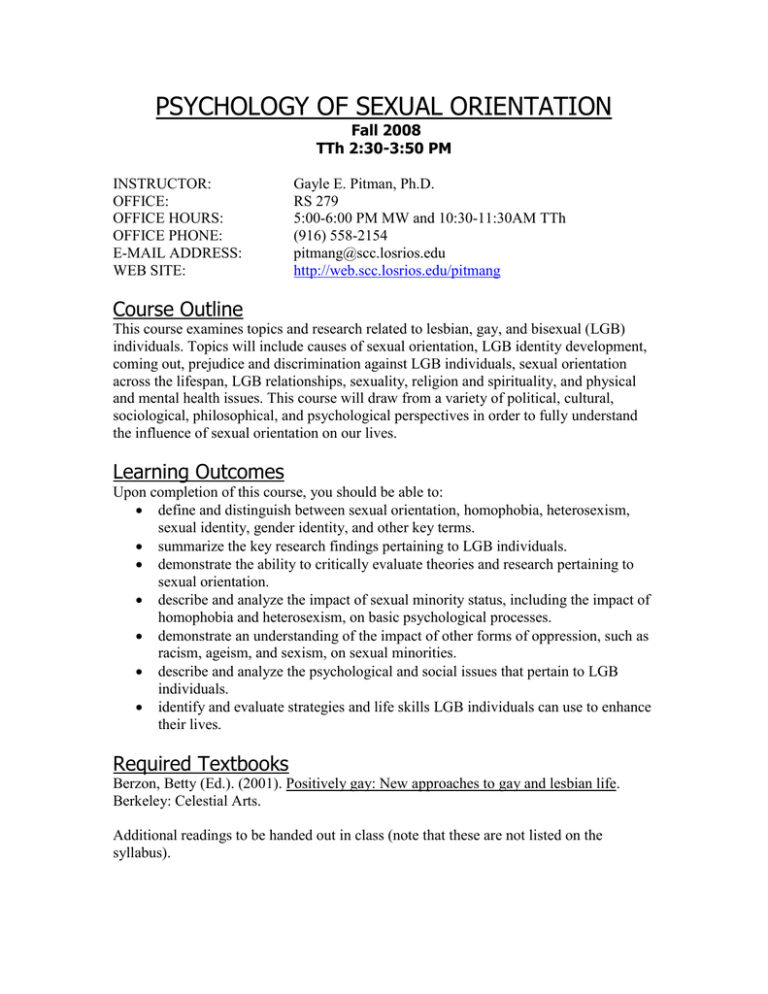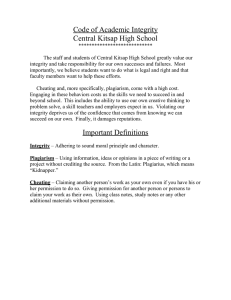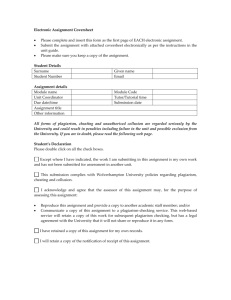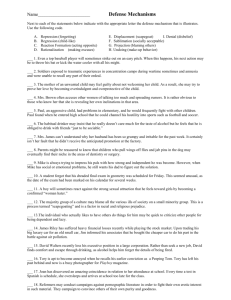PSYCHOLOGY OF SEXUAL ORIENTATION
advertisement

PSYCHOLOGY OF SEXUAL ORIENTATION Fall 2008 TTh 2:30-3:50 PM INSTRUCTOR: OFFICE: OFFICE HOURS: OFFICE PHONE: E-MAIL ADDRESS: WEB SITE: Gayle E. Pitman, Ph.D. RS 279 5:00-6:00 PM MW and 10:30-11:30AM TTh (916) 558-2154 pitmang@scc.losrios.edu http://web.scc.losrios.edu/pitmang Course Outline This course examines topics and research related to lesbian, gay, and bisexual (LGB) individuals. Topics will include causes of sexual orientation, LGB identity development, coming out, prejudice and discrimination against LGB individuals, sexual orientation across the lifespan, LGB relationships, sexuality, religion and spirituality, and physical and mental health issues. This course will draw from a variety of political, cultural, sociological, philosophical, and psychological perspectives in order to fully understand the influence of sexual orientation on our lives. Learning Outcomes Upon completion of this course, you should be able to: define and distinguish between sexual orientation, homophobia, heterosexism, sexual identity, gender identity, and other key terms. summarize the key research findings pertaining to LGB individuals. demonstrate the ability to critically evaluate theories and research pertaining to sexual orientation. describe and analyze the impact of sexual minority status, including the impact of homophobia and heterosexism, on basic psychological processes. demonstrate an understanding of the impact of other forms of oppression, such as racism, ageism, and sexism, on sexual minorities. describe and analyze the psychological and social issues that pertain to LGB individuals. identify and evaluate strategies and life skills LGB individuals can use to enhance their lives. Required Textbooks Berzon, Betty (Ed.). (2001). Positively gay: New approaches to gay and lesbian life. Berkeley: Celestial Arts. Additional readings to be handed out in class (note that these are not listed on the syllabus). Course Requirements Attendance: You are expected to attend class regularly. I will take attendance daily by passing around an attendance sheet. If you come in late and sign the attendance sheet at the end of class, you will be marked as tardy. Each absence will lower your attendance/participation grade by 5 points (two tardies equals one absence). Most classes will include class exercises, discussions, presentations, lectures, and videos designed to increase your understanding of the material. Missing class will mean missing out on these learning opportunities, and will likely result in poorer performance in the course. If you have a serious illness or problem and need to miss class, please contact me as soon as possible. Reading: It is expected that you have completed the assigned reading(s) BEFORE coming to class. You are expected to demonstrate your familiarity with the reading by asking questions and contributing to class discussion. The readings are designed to enhance your thinking about the psychology of women, and many of them will probably spark strong reactions. If you have a reaction to something you read, feel free to say so! Many of the assigned readings and articles discuss controversial issues and pose opinions you may agree or disagree with. We will use some class time to discuss these opinions. Assignments: Experiential Activity. For this assignment, you will engage in one experiential activity of your choice. You may choose from examples that I have provided, or you may choose your own activity and have it approved by me. Some examples of appropriate activities may include going to a movie theater and watching a movie that deals with homosexuality, attending a festival or fair (such as the Freedom Fair, Rainbow Festival, etc.), attending an event held at the Lambda Center/Sacramento Gay and Lesbian Center, or attending an LGB-themed concert or comedy show. After you participate in this activity, you will write a 3-5 page paper that addresses the following questions: -Describe the event or activity that you participated in. Why did you choose this activity? -Document your observations from this activity. For example, what were the other participants like? Was there diversity in terms of age, gender, and race/ethnicity? Were there mostly singles and couples at the event, or were there families with children? Did your observations confirm or contradict stereotypes about LGB individuals? -What did it feel like to participate in this activity? Was it comfortable and welcoming, or did it cause discomfort? Why do you think you might have had these feelings? What did you learn about yourself as a result of participating in this activity? Paper. You will be required to submit one written paper for this course. For this paper, you will select a topic and conduct a literature review of the issue. You will also identify one resource in the Sacramento area that pertains to this issue, and you will present an in-depth profile of this resource. You will receive more details about this paper in the first few weeks of class. Exams: There will be three exams and one final exam. There will be NO make-up exams; however, I will drop the lowest of the three exams. Therefore, if you need to miss class on an exam date, that exam will be the dropped grade. I will not drop the final exam grade. Please arrange your schedule so you will be in class on the days exams will be given, and be sure to save your “drop” grade for a true emergency situation. On exam days, please come to class with a Scan-Tron #882 form and a #2 pencil. If you come to class on exam day without these materials, you will not be allowed to take the exam until you get these items. Extra Credit: Several extra credit opportunities will be available to you throughout the semester. These options include the following: You may submit a reflective journal entry for extra credit points. Many of the topics we will cover in class will be thought-provoking and, at times, controversial. While you are strongly encouraged to voice your opinions in class, you may also elect to write your thoughts and reactions in a reflective journal. You may submit up to five reflective papers over the course of the semester (one per month). Each paper will be worth up to 20 points. We have several clubs here on campus that are open to all SCC students, and that are relevant to our course material. For example, the Women’s Alliance provides opportunities to meet other students with similar interests and to become politically involved in issues pertaining to women. In the Psychology Club, students can learn more about different areas of psychology and career options, and they can participate in psychology-related activities. The Queer-Straight Alliance is a group that is open to all students, both gay and straight, and it provides opportunities for social involvement and political activism. Other clubs on campus include the Environmental Awareness Club, the Honors Club, and the Hapa Club. You can earn extra credit by becoming involved in one of these clubs and engaging in an activity that pertains to our course material. Depending on your level of involvement, you can earn between 10-75 extra credit points. SCC and other colleges host seminars, speakers, workshops, etc. on issues pertaining to sexual orientation and/or gender. If you attend one of these events and turn in a thoughtful, well-written summary and reaction paper, you will earn 20 extra credit points. You may submit up to 2 reaction papers. You may earn no more than 100 extra credit points. Grades: Your grade will be based on the following components: Attendance/participation: 20% 200 points Semester exams (2 of 3): 30% (15% each) 300 points Experiential Activity: 10% 100 points Paper: 20% 200 points Final exam: 20% 200 points TOTAL POSSIBLE POINTS: 1000 points Extra credit journals: up to 10% 100 points Grades: A B C D F 900-1000 points 800-899 points 700-799 points 600-699 points 599 or below If you find that you are having difficulty with the course, or if you need to miss class due to a serious illness or problem, please do not hesitate to contact me as soon as possible. Please do not wait until the end of the term to contact me – the earlier you speak to me, the more likely we will be able to develop a plan to improve your grade. Additionally, if you have a disability including “invisible” disabilities like chronic diseases and learning disabilities, I encourage you to speak with me in order to discuss appropriate accommodations. Late Paper Policy In my opinion, there are very few valid reasons for turning a paper in late. Procrastination is not a valid excuse. Nor is having too much work from other classes; since all of the assignments for this class are described in the syllabus, you could conceivably begin each paper right now! It is probably becoming very clear that I strongly dislike receiving late papers. Because of that, I have a very strict “late paper” policy: I will accept papers one day after the due date, and I will lower the grade by one letter (so an “A” paper would receive a “B”). I will not accept papers any later than that, unless there are extreme circumstances. Classroom Etiquette In my opinion, students learn best when they are in an environment that challenges their thinking, yet respects each and every individual. It is very difficult to learn if one doesn’t feel respected and valued. It is perfectly fine (and encouraged!) to disagree with an idea or to hold an opposing point of view; however, it is unacceptable to subject an individual to personal attacks, put-downs, and insults. I ask that you refrain from the aforementioned behaviors. In the same vein, I like to create what I call a “safe zone” in my classroom. A “safe zone” is a place that is respectful of all people regardless of sexual orientation, ethnic background, age, religion, disability, and gender. It is expected that you will be respectful of others while you are in my classroom. Lastly, please be respectful in the following ways: Arrive on time and leave when class is over. If you need to leave early because of a one-time appointment, please let me know before class begins. Refrain from cross-talk and side conversations. Turn off cell phones and beepers during class. Do not bring children to class unless you have discussed it with me first. Waste Reduction All students are expected to participate in SCC waste reduction program. Please reduce and reuse whenever possible and always recycle the appropriate materials in the proper receptacles. We will discuss what kinds of materials go in each bin. Cheating and Plagiarism Cheating is against the policy of Sacramento City College. Cheating includes any attempt to defraud, deceive, or mislead the instructor in arriving at an honest grade assessment. Plagiarism is a form of cheating that involves presenting as one’s own the ideas or work of another. There are essentially two types of cheating and plagiarism. “Obvious” cheating is just that: obvious. Paying someone to write a paper for you, looking at your neighbor’s answers when taking an exam are examples of obvious cheating and plagiarism. Most students don’t engage in this behavior. What many students inadvertently do is what I call “soft plagiarism,” which involves failing to cite references or citing references inappropriately in your papers. This is much more common. If I catch a student engaging in “obvious” cheating or plagiarism, that student will receive a grade of zero for that particular assignment. If, on the other hand, I see examples of “soft” plagiarism in papers, I will call it to your attention. If I see a very minor instance (for example, missing one citation in your paper), I will just write a comment in your paper. If I see several instances, I will lower your grade slightly. If you fail to cite references at all and copy words directly from other sources, this falls in the category of “obvious” cheating. We will go over how to cite references appropriately, so by the time you write your papers for this class, you should be clear about how to avoid “soft” plagiarism. Cheating and plagiarism are very serious offenses. If you have any questions about these offenses, please come talk to me before class, after class, or during my office hours. Course Schedule (tentative) August 26 Introduction, terms, and definitions Readings: Berzon, “Developing a Positive Gay and Lesbian Identity.” (pp. 18-31) August 28 Introduction, terms, and definitions, continued September 2 What causes sexual orientation? September 4 What causes sexual orientation? (continued) September 9 Homophobia and heterosexism September 11 Homophobia and heterosexism (continued) September 16 Bisexualities September 18 Transgender identities September 23 Transgender identities (continued) Intersex conditions September 25 Intersex conditions (continued) September 30 EXAM #1 October 2 LGB people of color/racism Readings: Berzon, pp. 317-342 October 7 LGB people of color/racism, continued October 9 Coming out Readings: Berzon, pp. 109-138 October 14 Coming out, continued October 16 Identity development EXPERIENTIAL ACTIVITY DUE October 21 LGB youth Readings: Berzon, pp. 359-378 October 23 EXAM #2 October 28 Relationships Readings: Berzon, pp. 77-93 October 30 Relationships, continued November 4 Sexuality November 6 Sexuality, continued November 11 Parenting PAPER DUE November 13 Parenting, continued Aging November 18 Aging, continued November 20 EXAM #3 November 25 Religion/spirituality Readings: Berzon, pp. 197-233 November 27 NO CLASS - THANKSGIVING December 2 Physical health issues December 4 Mental health issues December 9 Activism and social change December 11 Review for final exam FINAL EXAM: Thursday, December 18 12:45-2:45 PM


